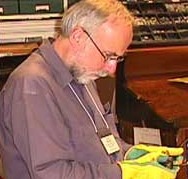T-50. Type, Lettering & Calligraphy, 1450–1830
James Mosley
The development of the major formal and informal book hands, the dominant printing types of each period, and their interrelationship. Topics include: the gothic hands; humanistic script; the Renaissance inscriptional capital; gothic types; roman types and the establishment of the Aldine roman in France; types of the Low Countries in the seventeenth century; calligraphy from the chancery italic to the English round hand; the new types of the eighteenth century; and early commercial typography. The course presupposes a general knowledge of Western history and some awareness of the continuity of the Latin script but no special knowledge of typographical history. See T-55 for a description of the continuation of this course.
It is presumed that applicants, even though they may not have had formal exposure to typographic history, have a considerable but general interest in the history of the book. In their personal statement, prospective students should describe their background in the field (if any), and mention what aspects of letterforms (if any) are of particular interest to them.
Course History
Faculty

James Mosley
James Mosley is Visiting Professor in the Department of Typography & Graphic Communication at the University of Reading. He was Librarian of the St Bride Library in London until 2000. As a student he was a compositor and a pressman at the Water Lane Press of Philip Gaskell in Cambridge. He had some working experience at the typefoundry Stevens, Shanks (originally Figgins) in London. He has written and lectured on the history of printing types and letter forms and was the founding editor of the Journal of the Printing Historical Society. In 2003 he received the annual award of the American Printing History Association for his contributions to printing history. His urbane and erudite blog, Typefoundry: Documents for the History of Type and Letterforms, is required reading for students of the history of typography.
Courses Formerly Offered
- T-50. Type, Lettering & Calligraphy, 1450–1830 (1984–2011)
- T-55. Type, Lettering & Calligraphy, 1830–2000 (1990, 2004, 2006, 2008 under slightly varying titles)
Full Bio »
